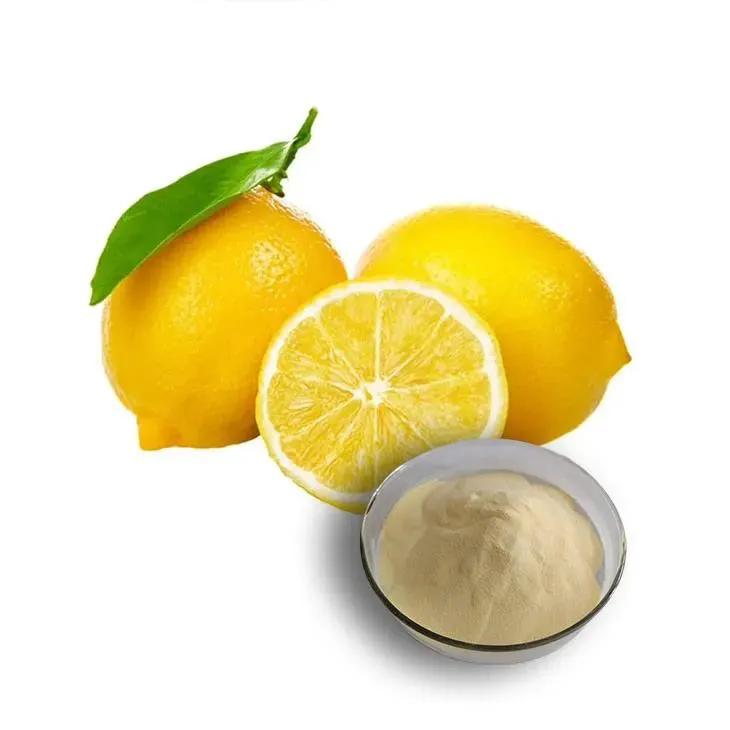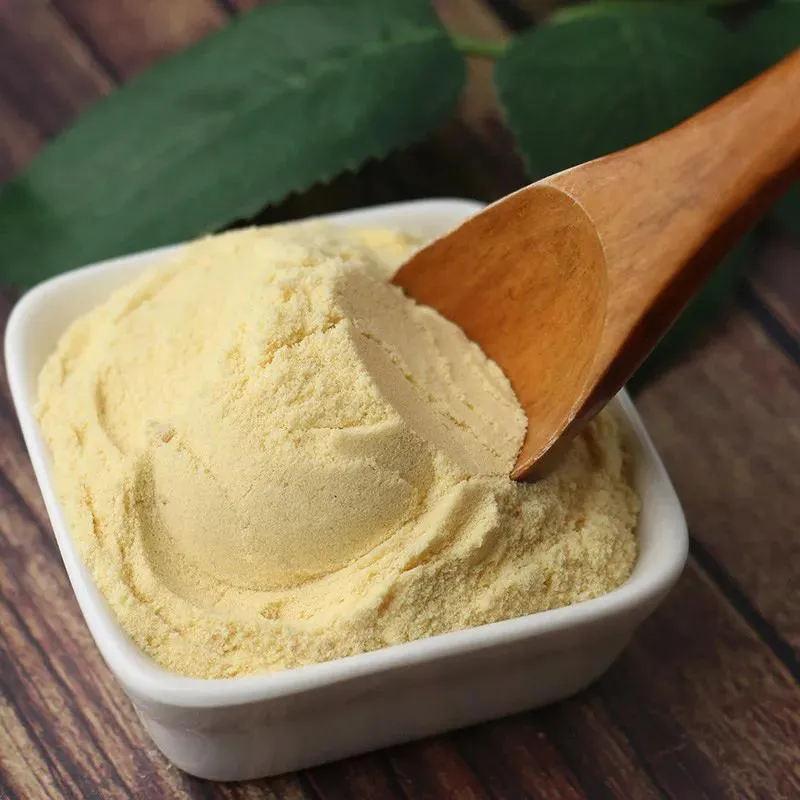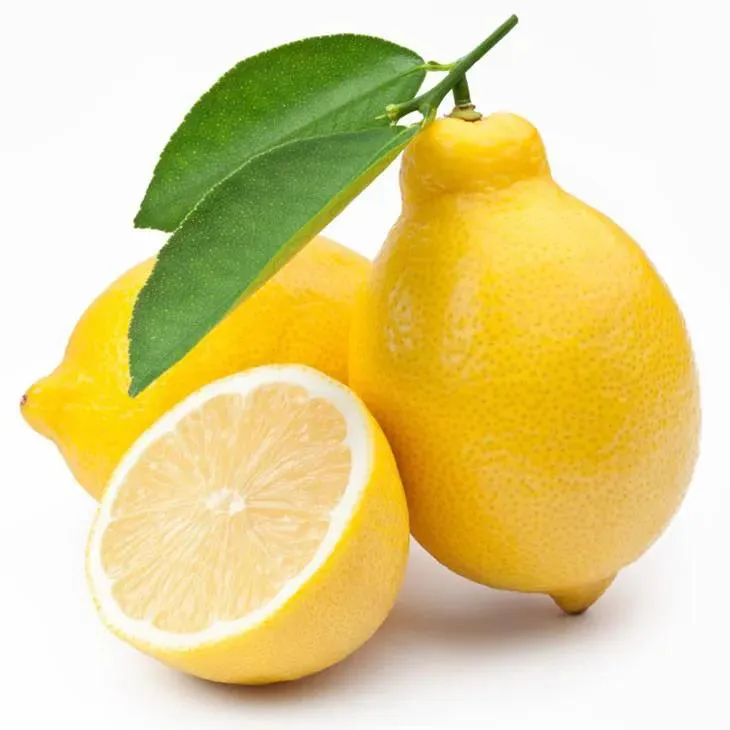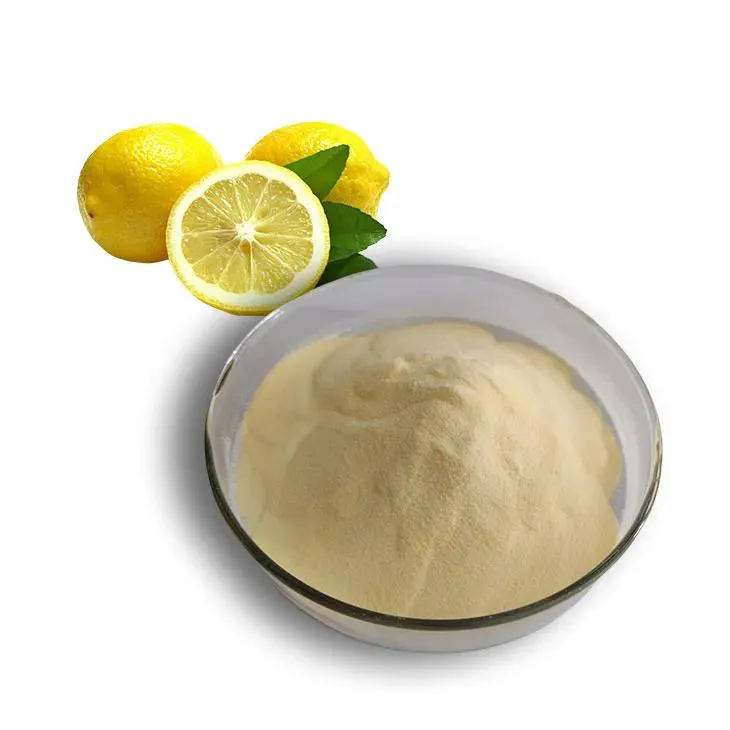- 0086-571-85302990
- sales@greenskybio.com
Chinese lemon juice powder factories.
2024-11-29

Introduction
China's Lemon Juice Powder factories are an integral part of the beverage and food industry. Lemon Juice Powder has gained popularity due to its convenience and long shelf - life, making it a preferred ingredient in many products. These factories are equipped with state - of - the - art production technology, enabling them to produce high - quality Lemon Juice Powder on a large scale.

Raw Material Sourcing
The quality of lemon juice powder starts with the raw materials. Lemon juice powder factories in China are meticulous when it comes to sourcing lemons.
Quality Selection
Only high - quality lemons are chosen. This involves evaluating factors such as the size, color, and firmness of the lemons. Lemons that are too small or have blemishes are typically rejected. Quality control at this stage is crucial as it directly impacts the final product.
Regional Sourcing
China has diverse regions where lemons are grown. Some factories source lemons from local orchards, which helps to support local farmers. Additionally, certain regions are known for producing lemons with unique flavors, and factories may target these areas to obtain lemons for specific product lines.

Production Process
The production of lemon juice powder involves a series of carefully orchestrated steps.
1. Washing and Preparation
Once the lemons are sourced, they are thoroughly washed. This is a vital step to remove any dirt, pesticides, or other contaminants. After washing, the lemons are sorted again to ensure that only the best ones proceed to the next step.
2. Juicing
The washed and sorted lemons are then juiced. Modern juicing equipment is used to extract as much juice as possible from the lemons. The juice is collected and filtered to remove any pulp or seeds, resulting in a smooth and pure lemon juice.
3. Dehydration
There are two main methods of dehydration used in lemon juice powder production:
- Spray Drying
Spray drying is a popular method. In this process, the lemon juice is sprayed into a hot chamber. As the droplets of juice come into contact with the hot air, the water in the juice evaporates rapidly, leaving behind a fine powder. This method is efficient and can produce a consistent powder with good flow properties.
- Freeze - Drying
Freeze - drying is another option. The lemon juice is first frozen, and then the frozen juice is placed in a vacuum chamber. Under low pressure, the ice in the frozen juice sublimates directly from a solid to a gas, leaving behind a dehydrated powder. Freeze - dried lemon juice powder often retains more of the natural flavor and nutritional value compared to spray - dried powder.
4. Packaging
After the dehydration process, the lemon juice powder is carefully packaged. Packaging materials are selected to protect the powder from moisture, light, and air, which can all degrade the quality of the powder. Common packaging includes sealed plastic bags or containers.

Meeting Domestic and Global Demand
Chinese lemon juice powder factories have a significant impact on both the domestic and international markets.
Domestic Demand
In China, lemon juice powder is used in a variety of products:
- Beverages
It is a common ingredient in powdered drink mixes, such as lemon - flavored iced teas and fruit punches. The powder can be easily dissolved in water, providing a convenient way to make refreshing drinks at home or in commercial settings.
- Food Products
Lemon juice powder is also used in baking, adding a tangy flavor to cakes, cookies, and pastries. It can also be used in savory dishes, such as marinades for meats or dressings for salads.
Export Market
China's lemon juice powder factories are increasingly exporting their products globally.
- Popular Export Destinations
Some of the major export destinations include the United States, Europe, and Southeast Asia. These regions have a growing demand for natural and convenient food and beverage ingredients.
- Meeting International Standards
To export their products, Chinese factories must meet international quality and safety standards. This involves strict compliance with regulations regarding food additives, packaging, and labeling. Factories often invest in quality control systems and obtain relevant certifications to ensure their products can enter international markets.

Economic Contribution
The lemon juice powder factories in China make important contributions to the economy.
Job Creation
These factories employ a significant number of workers, from those involved in lemon sourcing and production to those in sales and marketing. Jobs are created not only within the factory premises but also in related industries, such as packaging materials manufacturing and transportation.
Promoting International Trade
As exporters, these factories contribute to China's international trade balance. The export of lemon juice powder helps to earn foreign exchange, which can be used to import other necessary goods and technologies. Moreover, international trade also promotes cultural exchange and cooperation between China and other countries.
Innovation and Product Development
To stay competitive in the market, Chinese lemon juice powder factories are constantly innovating.
Improving Product Quality
Factories are investing in research and development to:
- Improve the flavor of lemon juice powder, making it more natural and intense.
- Enhance the nutritional value, for example, by finding ways to better preserve the vitamins and minerals during the production process.
- Optimize the powder's solubility, ensuring that it can be easily dissolved in different types of liquids.
New Product Development
There is a focus on developing new products:
- Lemon - Flavored Blends
Factories are creating unique lemon - flavored blends by combining lemon juice powder with other natural flavors, such as mint or ginger. These blends can be used in a wider range of food and beverage applications, appealing to different consumer tastes.
- Functional Lemon Juice Powder
There is also an emerging trend towards developing functional lemon juice powder. For example, adding probiotics or other health - promoting ingredients to the powder, targeting health - conscious consumers.
Conclusion
Chinese lemon juice powder factories are a vital part of the food and beverage industry. With their advanced production technology, high - quality raw material sourcing, and commitment to innovation, they are well - positioned to meet both domestic and global demand. Their economic contributions, in terms of job creation and international trade promotion, are also significant. As the market continues to evolve, these factories will likely continue to play an important role in the development of the lemon juice powder industry.
FAQ:
1. What are the main production processes in Chinese lemon juice powder factories?
The main production processes include carefully selecting and washing lemons to ensure purity. Then, the lemons are juiced and the juice is dehydrated using modern drying techniques such as spray drying or freeze - drying to turn it into a fine powder that retains the natural flavor and nutritional value of lemons.
2. How do Chinese lemon juice powder factories ensure the quality of their products?
They start by sourcing high - quality lemons. During the production process, strict quality control measures are implemented at each stage, from lemon selection and washing to the final powder production. Advanced drying techniques are used to preserve the natural flavor and nutritional value, which also contributes to product quality.
3. What is the significance of Chinese lemon juice powder factories in the international market?
These factories not only meet the domestic demand but also export their products globally. By doing so, they contribute to international trade, promote the popularity of lemon - based products, and help increase China's economic influence in the global food and beverage industry.
4. How do these factories contribute to economic development?
They contribute to economic development by creating jobs in various aspects of the production process, from lemon sourcing and processing to packaging and distribution. Also, through their exports, they bring in foreign exchange and promote economic growth.
5. What kind of new products are Chinese lemon juice powder factories developing?
They are constantly innovating to develop new products such as lemon - flavored blends for various applications in the food and beverage sector, which can be used in a wider range of products like baked goods, beverages, and confectionery.
Related literature
- Advances in Fruit Powder Production Technology"
- "The Global Market of Citrus - Based Food Ingredients"
- "Innovation in the Beverage Ingredient Manufacturing"
- ▶ Hesperidin
- ▶ Citrus Bioflavonoids
- ▶ Plant Extract
- ▶ lycopene
- ▶ Diosmin
- ▶ Grape seed extract
- ▶ Sea buckthorn Juice Powder
- ▶ Fruit Juice Powder
- ▶ Hops Extract
- ▶ Artichoke Extract
- ▶ Mushroom extract
- ▶ Astaxanthin
- ▶ Green Tea Extract
- ▶ Curcumin
- ▶ Horse Chestnut Extract
- ▶ Other Product
- ▶ Boswellia Serrata Extract
- ▶ Resveratrol
- ▶ Marigold Extract
- ▶ Grape Leaf Extract
- ▶ New Product
- ▶ Aminolevulinic acid
- ▶ Cranberry Extract
- ▶ Red Yeast Rice
- ▶ Red Wine Extract
-
Moringa powder
2024-11-29
-
Chaste Berry Extract
2024-11-29
-
Plantain extract
2024-11-29
-
Avocado Extract Powder
2024-11-29
-
Lemon Extract
2024-11-29
-
Lotus leaf extract
2024-11-29
-
Sophora Japonica Flower Extract
2024-11-29
-
Troxerutin
2024-11-29
-
Tamarind extract powder
2024-11-29
-
Wheat Germ Extract
2024-11-29





















